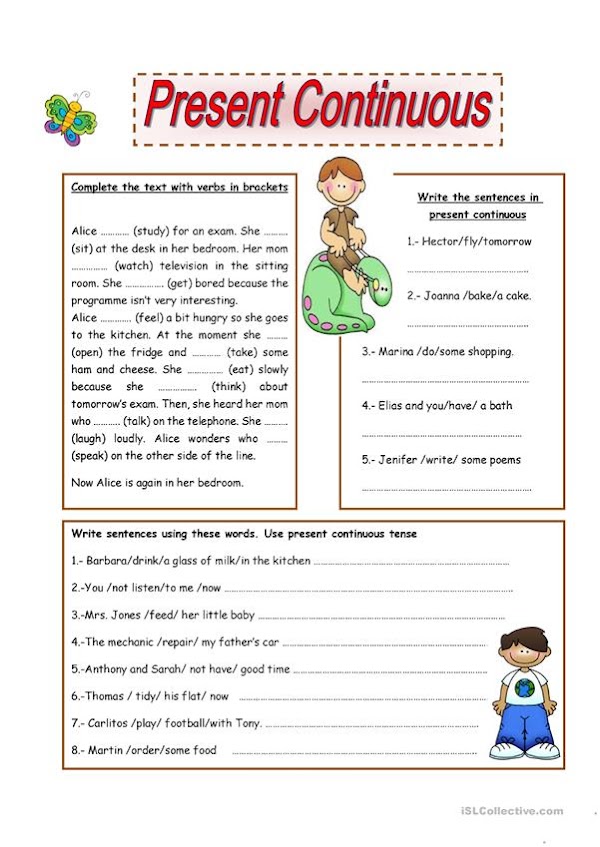PARTICIPLE
Причастие – это неличная форма глагола, сочетающая в себе свойства глагола, прилагательного и наречия. В русском языке ему соответствуют причастие и деепричастие.
У английских глаголов есть 2 формы причастия – настоящая и прошедшая
Participle Причастие | |
Present Participle -наст. Participle I (Verb + -ing) активное значение | Past Participle- прошед. Participle II (Verb + -ed/V3) страдательное значение. |
flying (летящий) playing (играющий) running (бегущий) sleeping (спящий) working (работающий) | played (сыгранный) stopped (остановленный) broken (сломанный) read (прочитанный) sold (проданный) |
В английском языке причастие настоящего времени имеет активное значение, а причастие прошедшего времени – пассивное.
1. The film was interesting. (active meaning) – Фильм был интересный.
2. I was interested by the film. (passive meaning) – Я был заинтересован фильмом.
1. It was a boring party. (active meaning)
2. Everyone at the party was bored. (passive meaning)
active meaning | passive meaning |
alarming (тревожащий) | alarmed (встревоженный) |
astonishing (изумляющий) | astonished (изумленный) |
disappointing (разочаровывающий) | disappointed (разочарованный) |
exciting (волнующий) | excited (взволнованный) |
exhausting (изнуряющий) | exhausted (изнуренный) |
humiliating (унижающий) | humiliated (униженный |
Если вы используете Participle I (V-ing), вы описываете человека или вещь.
The teacher was boring I nearly felt asleep.
Если вы используете Participle II (V-ed), вы говорите о том, что чувствуете вы или другой человек.
exciting – excited
I think football is a very exciting game. Я думаю, футбол – увлекательная игра.
Everyone at the stadium is so excited. Все на стадионе были увлечены.
Interesting – interested
I think being a nurse must be a very interesting job. Я думаю, работа медсестры очень интересная.
I am interested in looking after people. Мне интересно ухаживать за людьми.
Annoying – annoyed
My neighbors are very annoying. Мои соседи очень надоедливые.
They always play loud music and I am annoyed. Они всегда очень громко музицируют, и я раздражен.
Frightening – frightened
That horror film was too frightening for me. Этот фильм ужасов был очень пугающим для меня.
I was frightened even with the music in it. Меня пугала даже музыка в нем.
Participle может быть Simple или Perfect, в действительном или страдательном залоге.
Упражнение 1
Прочитайте предложения. Назовите причастия настоящего и прошедшего времени.
- He has flown to London three times.
- The sun was shining so I went for a walk.
- The man wearing a black suit is our teacher.
- The movie was extremely exciting.
- That girl looks lost.
- They have just arrived.
Упражнение 2
Выберите правильную форму и вставьте в предложение.
1. interesting/interested
This exercise is ________.
2. exciting/excited
On Christmas Eve, many children are so ______ that they stay up all night.
3. annoying/annoyed
My friend has a very ______ habit.
4. tiring/tired
I had such a ______ day I went straight to bed.
5. relaxing/relaxed
We were_________ after our holidays.
6. disgusting/disgusted
Their hamburgers are ________ .
7. satisfying/satisfied
I'm not __________ with my job.
8. boring/bored
George always talks about the same things, he is so __________.
9. disappointing/disappointed
I like this actor but the film was _________.
10.confusing/confused
English grammar can be________.
Упражнение 3
Open the brackets using the verbs in Present Participle and translate the expressions into Russian.
1. _______dogs (bark)
2. _______children (play)
3.________ girls (scream)
4._________ women (dance)
5. ________ducks (swim)
6.________ babies (cry)
7. ________water (run)
Open the brackets using the verbs in Past Participle and translate the expressions into Russian.
1.________ watches (repair)
2. ________сomputers (break)
3. _________students (bore)
4. __________doctors (worry)
5. _________boys (confuse)
6. _________exercises (write)
Упражнение 5
Open the brackets and fill in with the proper participle
1. He fell asleep (exhaust) by the journey.
2. She entered the dining room (accompany) by her husband and her father.
3. A snake (sleep) in the grass will bite if anyone treads upon it.
4. (Fill) his pockets with apples the boy was about to run away when he saw the owner of the garden with a stick in his hand.
5. It was a bright Sunday morning of early summer (promise) heat.
6. When I came home, I found the table (lay).
7. (Judge) by the colour of the sun it should be windy tomorrow.
8. (Arrive) at a big seaport, I started to look for a job.
9. He had received an urgent message (ask) him to telephone Sir Matthew.
10. He looked at groups of young girls (walk) arm in arm.
11. In the wood they sat down on a (fall) tree.
12. (See) from the hill the city looks magnificent.
13. (Not know) where to go he turned to a passerby.
14. (Lock) in her room she threw a fit.
15. (Address) the parcel, I went out at once to post it.
16. She often took care of my little sister (give) me a possibility to play with other boys.
17. (Wash) her face in cold water, she came up to the window and shut it.
18. Paul sat down again, evidently (change) his mind about going.









